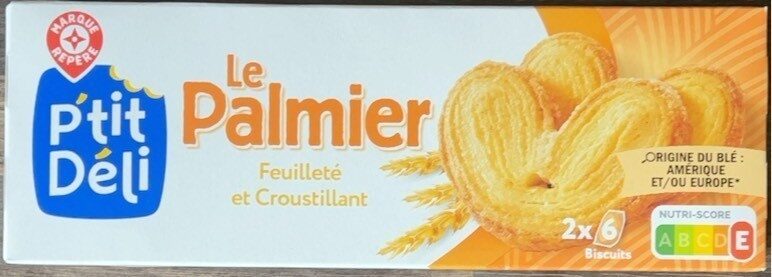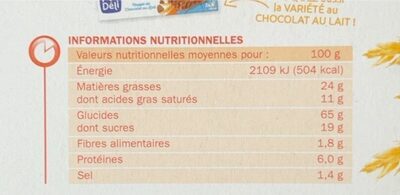Le Palmier (nouvelle recette) - P'tit Déli - 100 g
This product page is not complete. You can help to complete it by editing it and adding more data from the photos we have, or by taking more photos using the app for Android or iPhone/iPad. Thank you!
×
Barcode: 3564700000663 (EAN / EAN-13)
Common name: 12 biscuits feuilletés
Quantity: 100 g
Packaging: Plastic, Bag, Box, Cardboard
Brands: P'tit Déli, Marque Repère
Categories: Snacks, Sweet snacks, Biscuits and cakes, Biscuits, Flaky biscuits, Palmiers
Labels, certifications, awards: Nutriscore, Nutriscore Grade E
Stores: Leclerc
Countries where sold: France
Matching with your preferences
Report a problem
Data sources
Product added on by shaolan
Last edit of product page on by g123k.
Product page also edited by date-limite-app, ecoscore-impact-estimator, inf, kiliweb, morganesh, nmakaveli, openfoodfacts-contributors, packbot, quechoisir, roboto-app, scamark, sebleouf, segundo, tacite, yuka.R3BCZU1JUmUvYUF6cS8wSHh6WFZ4WWhZbDQyMmMwL25MdnNRSWc9PQ, yuka.WFljRlBiOERwUFJSdHZZVDlBTFY1czl6M0ptRlFGNmRJUFFQSWc9PQ, yuka.WW80d0ZJb1FndElibjhVaTV6S0x5L1pueVlHb1dsNmxNZVUwSVE9PQ, yuka.ZHFjOEhQcFlxTUFwdnRzLzhESFkydGgwd0k2TkFFL25BdnBOSUE9PQ, yuka.sY2b0xO6T85zoF3NwEKvlkAYePDmhS3CDR3Qi3HS4-WLP7PhQdt5vIHhPas, yuka.sY2b0xO6T85zoF3NwEKvlkMXDvbzmSzFEzj5whWPxYyLLqHYX8ksvafiGao, yuka.sY2b0xO6T85zoF3NwEKvlnZjTMfdux_YaALks1Wxw-i-ELO1U_xLuZjaKqs.












